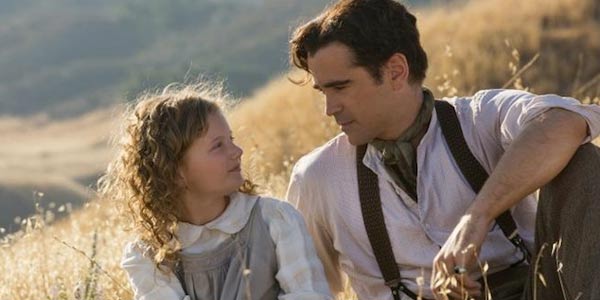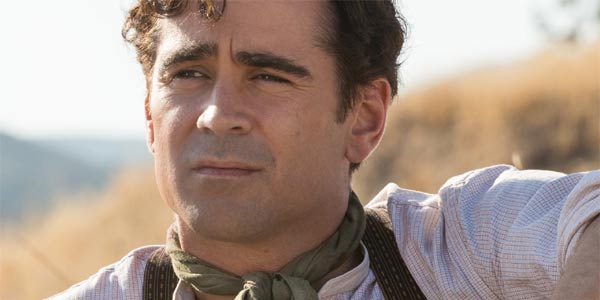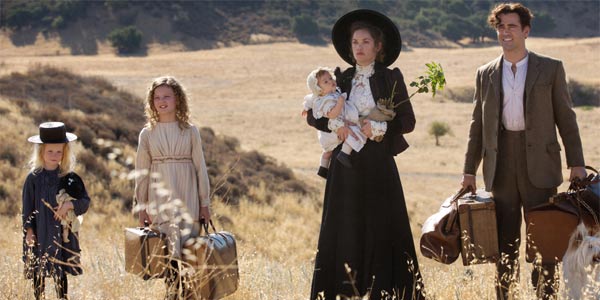Colin Farrell Discusses Altering The Audiences’ Perception In Saving Mr. Banks

When we first meet Colin Farrell’s character in John Lee Hancock’s Saving Mr. Banks he seems like he is the truly ideal father figure, playing the dad of a young P.L. Travers (who, as an adult, is played by Emma Thompson). He loves his children more than anything in the universe, sees the everyday as an adventure and believes the world is meant to be explored. He’s a Disney character if there ever was one. But as the film’s story progresses we slowly begin to realize that perhaps he is not the man who we all think he is and want him to be. It’s that altering of the audience’s perception that is at the heart of the Irish actor’s performance.
Last month I had the pleasure of sitting down with the star one-on-one at a press event for Saving Mr. Banks, and in our conversation we touched on multiple aspects of his impressive performance. Read on to find out more!
This has to be kind of a strange role for you, because your part of the story is completely separate from the P.L. Travers /Walt Disney’s side of the plot. When you were filming your scenes did it feel like you were in a completely different movie?
Very much, yeah, and our movie felt like it was kind of had its own entirety. It was a three act play, and we shot it in chronological order.
I was actually going to ask about that!
We did. They did us a massive solid. They weren’t doing it as a favor to us of course. It just worked out that they, we went to Big Sky Ranch, which is about an hour and half north of here and they found this beautiful bluff, this beautiful patch of land which had rolling scorched earth hills and we built a period house. It was so idyllic and it was just us. It was myself and Ruth Wilson and Annie Buckley, and the two kids, and the rest of the crew, which felt a lot more intimate than it may have been. White horse, six chickens, and we told this play that took place in this pastoral paradise and we felt very isolated from the modern world. It was really, really cool. So, it did feel like a complete film within the film.
When you are approaching scripts, do you look at them kind of from the macro perspective, looking at the entire story, or do you more focus on your specific character?
Your Daily Blend of Entertainment News
I mean there’s no point in doing a character that’s interesting or that excites you if it’s in something that you don’t believe in, know what I mean? But sometimes it is worth your while to do a character that you might not think is the most interesting in something that you think is genius. The most important thing, I think, is you know, you best serve self by serving the story, not best serving self by serving self in a way, just looking after your own character. So, yeah, six in one, half dozen in the other.
So, where did you kind of the P.L. Travers/Walt Disney side of the story in this one affect how you approached your performance?
It didn’t really at all.
It didn’t.
No, it’s didn’t really at all. I really felt like our storyline was exclusive of everything else that was happening, and I don’t know if the inversion of that would be true. I don’t know if the Walt Disney/P.L. Travers part of the story was affected at all by, in reading the script, by what happened between Travers and her mother, but it really felt like it existed in its own time and place, which is did of course and I felt like they could have just given me our pages and we all would have done the same performances.

There’s a really interesting evolution to your character in this movie that really comes through the audience’s perception. When you first meet Travers he seems like this free spirit, idyllic kind of guy, this perfect father.
Someone who weaves spells of the imagination.
But as we get deeper into the story we start discovering his faults and it’s almost like we’re seeing it through the child’s eyes realizing that her father isn’t really this great man. How did you approach that evolution of the character?
I mean, I have to give all credit to these to Kelly Marcel for designing such a beautiful script and for really, I mean, she really carved certain beats, because there are only a certain amount of scenes that we had, obviously. There are only a certain amount of times, reflections of the past are dropped in intermittently into the script, where P.L. Travers goes back into her mind, into her memory and she sees days gone by unfold, and so, they were kind of broad strokes. Every time we went back there was a state of development in Travers’ life, which was usually about his, you know, his internal degradation, you know. There was this real fall from grace. You meet him at the start, as you said, he has grace, like literally, physically, verbally, he has this grace to him and that begins to get chipped by time. He’s somebody who could suck it in for a little while, but at the end of the day, couldn’t follow through on his own myth. He could put this myth forth about life and what it is to live a free life, and be a free spirit, but couldn’t actually follow through on it himself.
Do you think he had all of those flaws from the very beginning, when we first see the character and it’s just hidden from us?
I think so. I think what happens in the telling of this film, and what we see, I think has probably happened before and I think that’s probably what they’re leaving. I think that’s some of what Ruth Wilson’s character anxiety is....
She’s already seen it.
She’s terrified. She doesn’t know what the future holds and he’s "Come on gang. Let’s go."
He makes it seem like a magical adventure.
Yes, he’s trying to drive the ship into this unknown territory of adventure and curiosity, when in fact he’s just running from another kind of sense of destruction.

And how much information is there out there?
Not a lot. I mean, it’s kind of, it’s hard to find any facts. They say there was some writing that he did spend some time in Ireland. Some say that he was born in Ireland, but maybe he spent a few summers in Ireland, but he was born in England and he ended up in Australia in his early 20s, where he met her mother, but he was somebody that was in love with Irish literature, and was in love with Irish folks and stories and limericks and singing songs, but his wanderlust, he physically kind of crossed from being a child, a boy to a man, but he could never emotionally cross that bridge, it seems.
Is it easier for you as a performer to not have a full picture?
I don’t know what’s easier. It’s all interesting. Directors I’ve worked with have asked me in the past, how do you like to work. Do you like to rehearse, and I literally go, "I like to do whatever you like to do. If you like to rehearse, I’m down with experiencing it that way and if you don’t, I’m cool with doing the work in my hotel room." I mean, the majority as your work as an actor is done on your own, the majority of preparatory work is done on your own, of course, and then you let it fly when you’re with the rest of the cast. So, I don’t know, you know, research is cool. I’ve done gigs where I’ve done a lot of research, but sometimes you can get bogged down in it as well. Sometimes it can become, I’ve found the research can become and exercise in academia, rather than instinct.
I can imagine it just blocking out the emotional part of it as well.
Sometimes, yeah.
What kind of conversations did you have with John Lee Hancock?
We did a little bit of rehearsal, mostly to just familiarize me with Annie and Annie with me, so we could just get through any nerves or anything, and it was pretty straightforward after that exchange. I mean myself and John definitely talked about stuff, but I think there was a mutual realization that we had a shared understanding of what this character’s journey was, and his purpose in the film was very clear, but outside of that, because someone asked me last night, "Did you feel there’s kind of an element of your guy being responsible for what she becomes. Did you feel the weight of that or the burden of that?" No, when you tell a story, you hope that that’s what the audience will gleam from it, because that’s how it’s designed in the script. So, we kind of knew what this guy was about in the script and how to get there, and to play next to Annie Buckley and you know, she was just the most beautiful canvas on which a future was yet to be lived, was being designed upon.
Do you think about the influence that you’re putting on the character? Do you look at the other side of the script and see what happened to her character and like try to find...
I mean, I read the script from start to finish, of course, and I know how it ends up. So, I could have a good shot at deciphering the emotional impact of the scenes between her and I, but it doesn’t really make me be any more brutal or try and design. It defies kind of that kind of strict measurement.
Is it just because there’s no way he could have known about all of that?
He wouldn’t know that, and he couldn’t stop himself. The Travers that’s in the script, that’s in the film, he couldn’t stop himself and he doesn’t even realize there’s a, as is often the case, doesn’t realize there’s a problem until it’s too late.
Just because In Bruges and Seven Psychopaths are two of my favorite films in the last 10 years, have you talking with Martin McDonagh at all about a new proect?
I got an email from him about two weeks ago, from I’m not sure what city. I think he was in Austin actually and he’s been on his travels. He packed up his back and off he went. He’s been driving, training all over America and he’s got a couple weeks left and I don’t know what he’s writing. I don’t know if he’s put pen to paper. I wish he would. I love working with him.
Yeah, I want you guys to make like eight movies a year.
I love working with him. That’s an easy sport for me.

Eric Eisenberg is the Assistant Managing Editor at CinemaBlend. After graduating Boston University and earning a bachelor’s degree in journalism, he took a part-time job as a staff writer for CinemaBlend, and after six months was offered the opportunity to move to Los Angeles and take on a newly created West Coast Editor position. Over a decade later, he's continuing to advance his interests and expertise. In addition to conducting filmmaker interviews and contributing to the news and feature content of the site, Eric also oversees the Movie Reviews section, writes the the weekend box office report (published Sundays), and is the site's resident Stephen King expert. He has two King-related columns.
